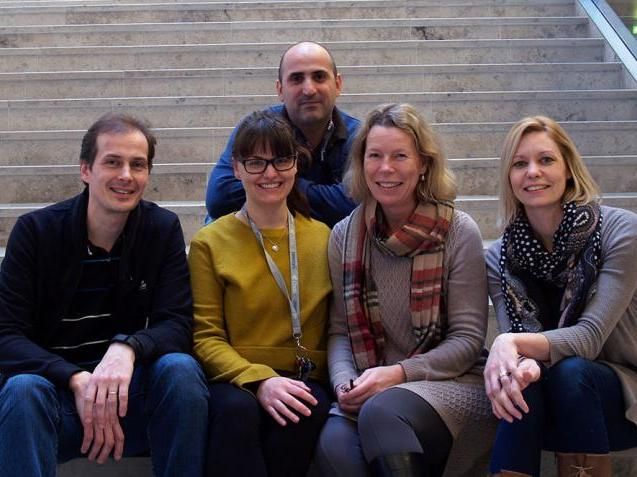INNUENDO -- a new platform for genomics integration in surveillance of food-borne pathogens
Advertisement
Multinational outbreaks of food-borne pathogens cause considerable threats to European public health. Implementing a whole genome sequencing (WGS) in routine surveillance and outbreak investigations is becoming a strategic goal for many public health authorities all over the world. With this in mind a group of researchers have developed an initiative called INNUENDO, which aims to deliver a cross-sectorial framework of bacterial WGS integration in routine surveillance and epidemiological investigations. The project is coordinated by Assistant Professor Mirko Rossi from the University of Helsinki, and co-financed by a Thematic Grant of the European food Safety Authority (EFSA).

The project coordinator, Assistant Professor Mirko Rossi is in the back. In front, from the left are Docent Janne Lunden, Ph.D. Ann-Katrin Llarena, Professor Maria Fredriksson-Ahomaa and Docent Mari Nevas.
Faculty of Veterinary Medicine, University of Helsinki.
The potential of widespread, routine use of WGS analysis for public health protection is essentially restricted by the absence of accessible IT framework, and a threshold of public health microbiologists in handling these novel methodologies. The aim of the INNUENDO project is aligned with the European Food Safety Authority (EFSA) mission to promote the development and validation of new approaches in microbial characterization throughout coordinate efforts between all public health and food safety stakeholders. The project started on 15 January and the agreed duration is 30 months. EFSA is co-funding the project with a Thematic grant by approximately half a million euros. "This is a unique opportunity for authorities and academic institutions to influence the ongoing genomic revolution in public health microbiology" highlights the project coordinator, assistant professor Mirko Rossi from the Faculty of Veterinary Medicine, University of Helsinki.
Who is involved?
To design an affordable and sustainable diagnostic infrastructure, the INNUENDO consortium includes governmental organisations, authorities and research institutes from the food, veterinary and human sectors, from Finland, Estonia, Latvia, Portugal, Basque Autonomous Community in Spain and Austria. The project members are Docent Mari Nevas from the University of Helsinki; Dr. João Carriço from the University of Lisbon, Professor Javier Garaizar from the University of Basque Countries, Friederike Hilbert from the University of Veterinary Medicine (Vienna), Dr. Saara Salmenlinna from Finnish National Institute for Health and Welfare, Dr. Marjaana Hakkinen from Finnish Food Safety Authority, Dr. Monica Oleastro from Portuguese National Health Institute, MSc Mihkel Mäesaar from Estonian Veterinary and Food Laboratory and Professor Aivars Bërzinš from Latvian Institute of Food Safety, Animal Health and Environment.
"Allowing project stakeholders to assess design choices early on in the development cycle, this multinational collaboration in the 'One-health' context will ensure that the planned infrastructure will address the requirement for the integration of WGS in routine analysis in the food chain," says Rossi.
How to maximize the food safety?
"Standardization and calibration of process and simplification of data analysis and interpretation are the two basic conditions allowing the transition from the current diagnostic paradigm to a full WGS consolidation. Moreover, the lack of accessible informatics infrastructure for data processing and integration is still the major obstacle to implementation of WGS. Thus, it is now essential that advances in bioinformatics and bacterial genomics encounter the needs of the public health microbiology," explains Rossi. This goal is reachable only throughout an integration of competencies across different disciplines and professions. Therefore, throughout active cooperation between experts in bacterial genomics, evolution, bioinformatics, epidemiology and specialists in validation, food control and public health, the INNUENDO consortium will use a cross-sectorial approach in developing a common framework for maximizing the benefit to use WGS in food safety.
Small countries with limited resources might not be able to succeed in reaching this goal in the near future, putting several EU member states in a condition of inferior capabilities for outbreak detection and investigation. To guarantee the reinforcement of European capacities to ensure protection of citizens against cross border health threats, EU must enable wider access to the new methodologies. An increased level of cooperation between the local, national and European competent authorities by dedicated training, development of a common pathogen database and validation of new approaches in microbial characterization is warranted.


















































